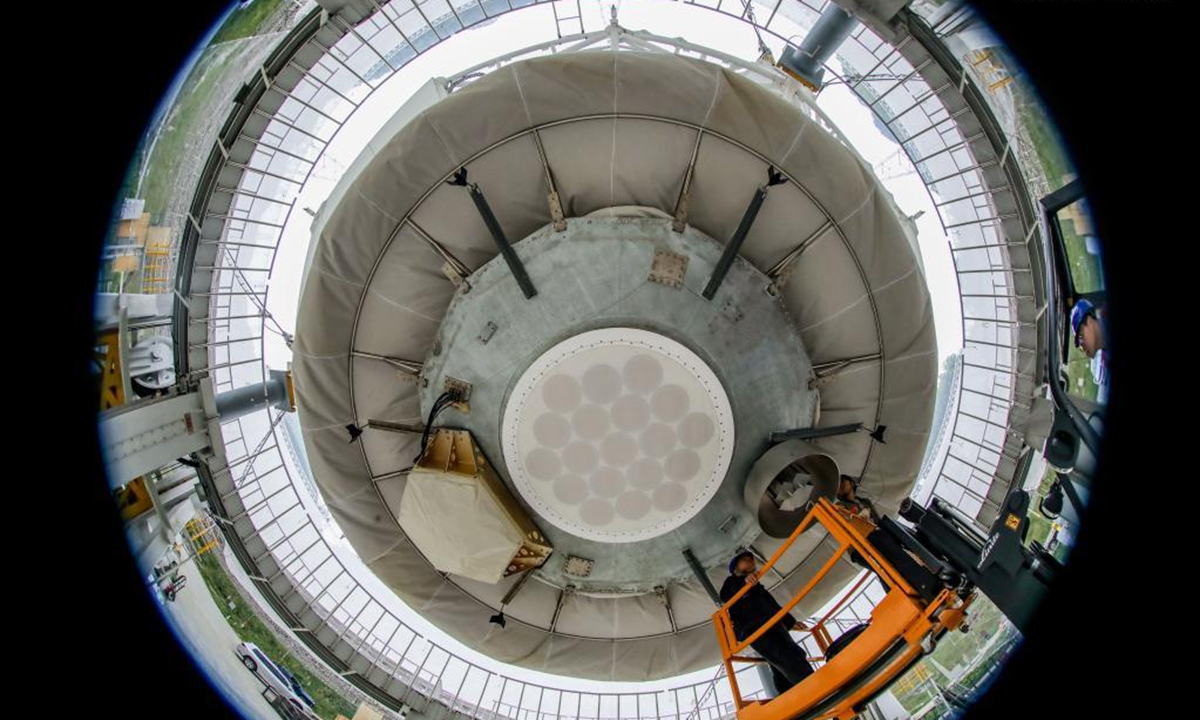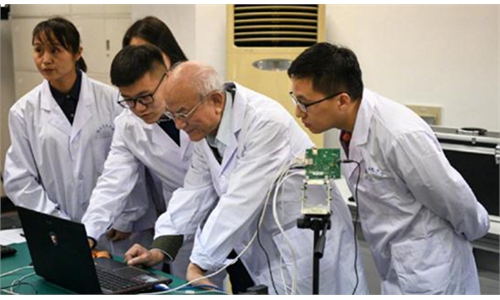Nation to open sci-tech sector wider to world while continuing pursuit of indigenous innovation: minister

Photo taken with a fisheye lens on March 28, 2021 shows staff members conducting maintenance work on the feed cabin of the Five-hundred-meter Aperture Spherical Radio Telescope (FAST) in Pingtang County, southwest China's Guizhou Province. Starting formal operations in Jan. 11, 2020, the FAST is believed to be the largest and most sensitive radio telescope in the world, which has a huge potential for verifying and exploring mysteries of the universe. (Xinhua/Ou Dongqu)
China will open up its science and technology sector wider to the outside world while continuing the pursuit of indigenous innovation, Minister of Science and Technology Wang Zhigang said on Monday.China's sharing of its sci-tech advances contributes immensely to addressing global issues spanning energy, the environment and coronavirus containment, experts said, while calling for corresponding opening-up moves by other economies.
And, the country's sci-tech industry openness ought to be coordinated with its push for tech security, the experts stressed.
At a press conference in Beijing where the country's sci-tech achievements over the past decade were enumerated, Wang said that China has implemented an open, inclusive, reciprocal and shared strategy for international science and technology cooperation, continuing sci-tech partnerships with 161 countries and regions.
The country has ramped up efforts to rev up innovation along the route of the Belt and Road Initiative. Additionally, it has joined a fruitful research push globally to tackle climate change, food security and human health, among other issues, the minister added.
Wang pledged even larger openness as the country stands ready to communicate and cooperate with its peers and strive to make more contributions to global sci-tech advances and sustainable development.

Graphic: GT
In a sign of the openness, 27 research projects from 14 countries have been allocated scientific observation time using the Five-hundred-meter Aperture Spherical Radio Telescope (FAST), known as China's Tianyan or "Sky Eye," Hou Jianguo, president of the Chinese Academy of Sciences, disclosed at the press conference.The FAST, in Southwest China's Guizhou Province, is the world's largest single-dish and most sensitive radio observatory.
The indigenously developed FAST epitomizes China's meteoric high-tech rise since the CPC's 18th National Congress in 2012.
China's research and development (R&D) spending rose to 2.79 trillion yuan ($420.06 billion) in 2021, accounting for 2.44 percent of the country's GDP, official data showed. This compared with R&D expenditure of 1.03 trillion yuan in 2012, or 1.91 percent of the GDP then.
Further, the country took the 12th spot on the World Intellectual Property Organization's annual global innovation index in 2021. It was ranked 34th in 2012.
In another sign, the number of country's high-tech firms surged to 330,000 last year from 49,000 a decade ago, according to Wang.
The past decade also saw the biggest increase in engineering technological strength, Li Xiaohong, president of the Chinese Academy of Engineering, said at the press conference, citing world-class projects built over the past 10 years such as the Tiangong Space Station and the Deep Sea No.1 - the country's first self-operated 1,500-meter deep-water gas field.
Such achievements will underpin China's contribution to a global joint endeavor to use technology to address wide-ranging issues like energy, the environment, climate change, and virus prevention and control, said Wang Peng, assistant professor at the Gaoling School of Artificial Intelligence at the Renmin University of China, speaking of the country's readiness to share its research findings and applications.
Nonetheless, such sharing shouldn't be one-sided, Wang told the Global Times on Monday, urging foreign institutions to make their research data and findings openly assessable to China.
With a good number of Chinese high-tech firms, and research institutions subject to reckless US sanctions and China's tech rise at large challenged by weaknesses in areas such as core algorithms and lithography - a crucial step in the process of semiconductor making -- "it's imperative for the country to stay open while being mindful of the national security when it comes to sharing of research data, models and specific applications," he said.
Another highlight from Monday's press conference was the official response as to whether the government's recent moves to stimulate the sci-tech industry as part of broader pro-growth measures indicate an easing of the country's technology sector regulation.
"Motivation and oversight are two sides of the governance coin", the minister said, emphasizing that motivation is in most cases put in a more important place, and it's believed that "our entrepreneurs and businesses can make more positive contribution to the economy, society and people's livelihood."
Instead of hardening or softening oversight, the country is heading for a path favoring institutionalized and law-abiding supervision on a regular basis, Pan Helin, joint director of the Research Center for Digital Economics and Financial Innovation affiliated with Zhejiang University's International Business School, told the Global Times on Monday.
It should be clarified that the push against unfair competition, among other regulatory practices, is intended to strengthen the competitiveness of technology start-ups, Pan said.



